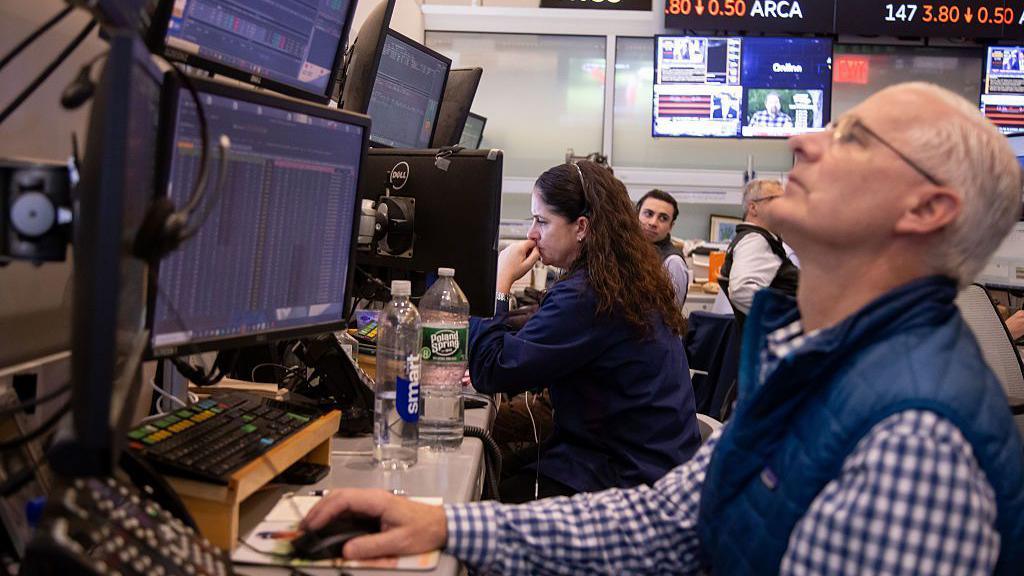US stocks make historic gains after Trump pauses some tariffs

- Published
US shares have rocketed after US President Donald Trump said he would suspend steep tariffs on goods from most countries, and instead impose a 10% import tax rate.
The White House said it was backing off on higher levies for trade partners that had agreed to negotiate, although Trump said he would raise tariffs on goods from China even further, to at least 125% "effective immediately".
The S&P 500 soared 9.5% in the biggest one-day rally since 2008, following days of turmoil sparked by the tariffs.
Trump's decision came less than 24 hours after the latest round of tariffs had come into force, hitting key trade partners, such as Vietnam, which saw its imports facing a new levy of 46%.
The duties, which the president had announced last week, were higher and more far-reaching than many on Wall Street had anticipated.
In the aftermath of the announcement, the S&P plunged more than 10% and many analysts warned of the rising risk of economic recession in the US and globally.
By Wednesday, the fears had hit the bond market, where investors started dumping US government debt.
"Although President Donald Trump was able to resist the stock market sell-off, once the bond market began to weaken too, it was only a matter of time before he folded," said Paul Ashworth, chief North America economist for Capital Economics.
He said he expected Trump to return to the plan for a 10% universal tariff that he called for in his presidential campaign last year, though warned that it would take time for for the US and China to work out a deal.
"It is difficult to see either side backing down in the next few days," he said. "But we suspect that talks will eventually happen, although a full rollback of all the additional tariffs applied since Inauguration Day appear unlikely."
The Dow ended the day up more than 7.8% and the Nasdaq skyrocketed more than 12%.
Companies such as Nike, which makes roughly half its footwear in Vietnam, jumped 11%, while Apple soared roughly 15%.
Despite the gains on Wednesday, the leading indexes in the US remained lower than they were before Trump's announcement, with the S&P 500 off about 3% and down more than 8% for the year.
The levies on goods from China, America's third largest supplier of imports, remain an economic challenge.
The country sent more than $400bn in goods to the US last year and was the source of an estimated 60% of footwear imports and roughly 36% of clothing imports in January, according to the American Apparel and Footwear Association.
Before Trump's announcement, the National Retail Federation had warned that shipments handled by US ports in May were likely to be 20% lower than a year earlier due to the tariffs.
In appearances after his decision on Wednesday, Trump said that he hoped to strike a deal with China, and was also considering granting exemptions to tariffs for individual companies, a shift from earlier comments.
"I saw last night where people were getting a little queasy," he said, acknowledging the concerns, though he has signalled he remains committed to duties on key strategic sectors, such as cars, steel and aluminium, and is eyeing other industries such as pharmaceuticals and lumber.
His decision to offer a respite from the so-called reciprocal duties followed rising political pressure in Washington and from other influential figures that had backed him during last year's presidential campaign, including Tesla boss Elon Musk, billionaire Bill Ackman and Barstool Sports founder Dave Portnoy.
But the abrupt climbdown still caught many off-guard.
Almost at the same time as Trump posted his move on social media, Goldman Sachs issued a report predicting a recession in the US economy triggered by the steep duties.
Two hours later, the bank said it was reverting to its earlier forecast, which, even assuming lower tariffs than the president had announced last week, expected minimal growth this year and put the odds of a recession at 45%.
Mr Ackman, who had earlier called for a 90-day tariff pause, praised the president on social media: "Thank you on behalf of all Americans," he said.